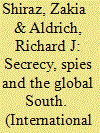| Srl | Item |
| 1 |
ID:
193285


|
|
|
|
|
| Summary/Abstract |
This paper explores the link between the prevalence of violent conflicts and the extremely low female labor force participation rates observed in South Asian countries. The Labor Force Surveys from Bangladesh, Sri Lanka, India, and Pakistan are merged with the Global Terrorism Database to estimate the effect of terrorist attacks on female labor supply. We exploit the geographical variation in exposure to violence to compare administrative units exposed to events with those not exposed. We find that for each wounded and killed person, female labor force participation falls 0.000026 and 0.0001 percentage point, respectively, while male labor force participation remains unchanged, thus widening the gender labor participation gap. We test the non-linearity of various violence effects, finding that the deterring effect is higher in administrative units with higher baseline FLFP rates. We also provide suggestive evidence that terrorism has a negative effect on the intensive margin of female labor supply.
|
|
|
|
|
|
|
|
|
|
|
|
|
|
|
|
| 2 |
ID:
170397


|
|
|
|
|
| Summary/Abstract |
The study of secrecy and spies remain subjects dominated by Anglo-American experiences. In recent years there has been some effort to refocus the lens of research upon ‘intelligence elsewhere’, including the global South. This is partly because of intense interest in the Arab Spring and ‘managed democracy’, placing a wider range of secret services under the spotlight. However, the approach to research is still dominated by concepts and methods derived from studying the English-speaking states of the ‘Five Eyes’ alliance and their European outriders. This article calls for a re-examination of research strategies for Intelligence Studies and for those theorizing surveillance, suggesting that both fields have much to learn from area studies and development studies, especially in the realm of research practice and ethics. If the growing number of academics specializing in intelligence genuinely wish to move forward and examine the global South they will need to rethink their tool-kit and learn from other disciplines. We suggest there is a rich tradition to draw upon.
|
|
|
|
|
|
|
|
|
|
|
|
|
|
|
|